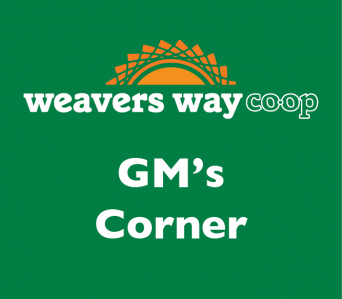
GM's Corner: The Part the Co-op Plays in Strengthening Our Local Food Shed
“The proper role of government,” according to former President Dwight Eisenhower, is to be “a partner of the farmer,” so that “Agriculture may continue to be the sound, enduring foundation for our economy.”
With this statement, Ike succinctly sums up nearly 100 years of United States food policy.
What cynics would call our “food industrial complex” is referred to by the U.S. Department of Agriculture as our “food system.” It includes everything from farming to food production, packaging and distribution, retail and consumption.
Since the Great Depression, presidents of both parties have seen the federal government as a “partner of the farmer,” primarily because they’ve (quite correctly) concluded that keeping the people fed is fundamental to national security. That many Americans go hungry anyway is a failure of public policy, not a failure of the nation’s food system, which is capable of producing ample food to meet the nutritional needs of all Americans.
The inevitable outcome of a century of food policy focused almost entirely on keeping the masses fed is a food system that is undeniably remarkable but also hugely problematic. In the name of maximizing output at the lowest possible cost, America’s food system is highly dependent on fossil fuels, fertilizers, pesticides, genetically modified crops and single-use plastic. And most Americans would prefer not to think about the system’s chronic exploitation of workers and the horrific conditions in which animals are raised and slaughtered.
Industry consolidation has occurred at every level, from the farmer to the retailer, so that every year there are fewer and fewer players that are part of an ever-growing national food system. Put another way, at no point in our history have so many of us been so dependent on so few.
So far, America’s food system has proven resilient during the pandemic. Early on there were some supply chain issues, but for most people it was little more than an inconvenience. The system adapted and endured.
But the pandemic did raise alarms about our food system’s fragility. One particular area of concern were the giant meat and poultry processing facilities that are a critical link in the chain. At one point it was feared the virus would force many of these facilities to close. This could have had a catastrophic effect on the entire system, impacting everyone from farmers to consumers.
So an important takeaway from the pandemic is that the nation’s food system is vulnerable and it wouldn’t take much – another, even deadlier pandemic; an act of sabotage; cataclysmic weather events – to knock it offline. The good news for us is that an alternative system already exists, and we as a Co-op have an important role to play.
As many noticed, during the pandemic the Co-op did not suffer the same supply chain woes as the big grocery chains. We had some problems, for sure, but because we are less reliant on the larger national food system, we fared better than most grocers.
Weavers Way is a critical component of the local food system, otherwise known as the Philadelphia food shed. And strengthening it should be a top priority in the post-pandemic world.
Our local food shed isn’t what it used to be. Suburban sprawl gobbled up hundreds of square miles of farmland that had for centuries served as the city’s breadbasket. The city’s big food producers — meat packing plants, dairies, commercial bakeries, etc. — have almost all closed.
But by geographic happenstance, the Philadelphia region, despite being part of the East Coast megalopolis, is still surrounded by an impressive agricultural green belt that stretches counterclockwise from Lancaster County into Maryland, Delaware and New Jersey, and back around to the northern environs of Bucks and Montgomery counties. The diversity of this green belt is extraordinary: Farmers grow everything from sweet corn to salad greens, apples and stone fruit, poultry and beef, and milk and cheese.
In and around the city, there’s an ever-growing contingent of food producers who make everything from bread to beef jerky.
Last year, the Co-op sold products from 260 local food businesses; local sales represent about one-third of our total sales. While we recognize there are limits to how much locally grown and produced food we can sell — there’s no such thing as local bananas or local citrus fruit — there’s still opportunity for the Co-op to play an even more important role in supporting the Philadelphia food shed.
We should consider it our patriotic duty to reduce our dependency on the nation’s fragile and morally problematic food system. So allow me to borrow and modify Ike’s quote to fit our times and circumstance:
“The proper role of our Co-op is to be a partner to the local farmer and food producer, so that the Philadelphia food shed may continue to be the sound, enduring foundation for our local economy.”
See you around the Co-op.
